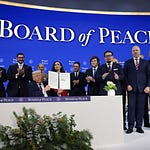Let me say it straight.
Iran is getting played.
Hard.
And honestly? They walked themselves into this one.
You’d think after decades of sanctions, color revolutions, and regime change operations, they’d finally get it. But no. Just like Russia once did, they’re still clinging to this fantasy that if they just act “reasonable” enough, the West will eventually let them in.
That if they behave—talk soft, tone it down, cut a deal—they’ll be spared.
Guess what?
On June 13th, Israel launched a full-on airstrike targeting Iran’s nuclear facilities. Not just some symbolic strike—this was a decapitation attempt, meant to take out Iran’s leadership.
The next day? Iran hit back. Missiles, drones, the whole package.
But it was already too late.
They got caught off guard.
Why? Because they were mid-negotiation with the U.S. over the nuclear deal.
And they actually believed that meant Israel wouldn’t touch them.
Seriously?
That kind of thinking is exactly what the enemy wants you to believe.
You think talks mean you’re safe? They think talks mean you’re distracted.
You show restraint? They show teeth.
This is what I keep calling strategic fantasy. It’s the most dangerous thing a country can fall into. Not because it’s naive—but because it gets people killed.
Iran thought they were playing chess. But they were on the board—as a pawn.
And here's the kicker: this isn’t the first time we’ve seen this movie.
Russia did the exact same thing.
Remember the early 2000s? They wanted to join the G8, build gas pipelines to Europe, play nice with NATO. They were practically begging to be part of the West’s little club.
And what did they get for it?
Sanctions. Isolation. NATO expansion right to their doorstep.
You know the rest.
Iran’s doing the same dance now. One foot in the anti-imperialist camp, the other still tapping on the door of the U.S. State Department, hoping for a smile.
But it gets worse.
They don’t even commit to the allies they do have.
Take China and Russia. Iran’s attitude toward them has been, at best, lukewarm.
You want proof?
Back in 2015, when Iran signed the JCPOA—the nuclear deal with the U.S.—they immediately turned cold on China. Like, “Cool, thanks for the backup, we’re with America now.”
And what happened?
The U.S. ripped up the deal two years later. Sanctions came roaring back.
And suddenly, Iran looked around and realized the East didn’t rush in to save them.
Why? Because trust isn’t built on short-term gestures. It’s built on consistency.
Iran’s been acting like a geopolitical free agent—shopping for partners like it’s a buffet.
And no serious power is going to go all-in on someone who might flip the moment the West offers a handshake.
Now, don’t get it twisted—China does have reasons to care about Iran.
Especially on the energy front.
Iran is one of China’s most important oil suppliers. If Iran collapses, or gets fully absorbed into the Western camp, China’s left leaning even harder on Russia for oil.
And let’s be honest—China doesn’t want to be energy-dependent on anyone, even a so-called partner like Russia.
Strategic autonomy requires options. And losing Iran as an option? That’s a problem.
So no, China’s not indifferent to what happens to Iran.
But it’s also not going to burn political capital for a country that hasn’t even decided who it wants to stand with.
Iran’s problem isn’t just military or economic—it’s psychological.
It’s this desperate need to believe that if they just act rational, the irrational world around them will reward them.
That if they cooperate in good faith, they’ll be seen as a responsible player.
That if they give a little, the West will give something back.
That’s not diplomacy. That’s wishful thinking.
Geopolitics doesn’t work that way. It’s not about fairness. It’s about leverage.
Strength. Alignment. Loyalty.
If you’re not building power, building trust, or building a side—then you are the side being played.
Iran keeps trying to be both revolutionary and respectable.
But in today’s world, that just makes you vulnerable on both fronts. You’re not feared, and you’re not welcomed.
You’re just… available.
And when a country becomes available, it becomes expendable.
So let’s stop pretending.
Let’s stop pretending the West ever wanted Iran in the club.
Let’s stop pretending Israel ever needed a reason to strike.
Let’s stop pretending that “being moderate” was ever going to protect anyone.
Because if a country can’t decide who its real allies are…
If it can’t commit, can’t build trust, can’t stop hoping for validation from its enemies...
Then it’s not a player in this game.
It is the game.
And that’s when the knives come out.










